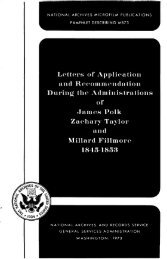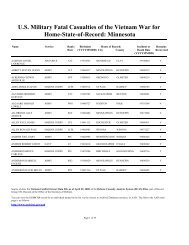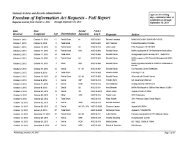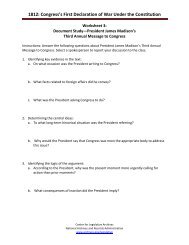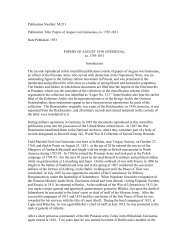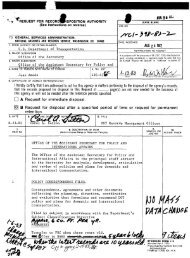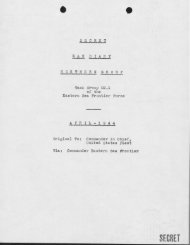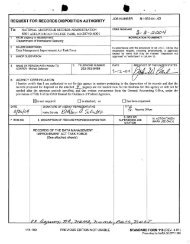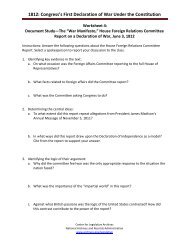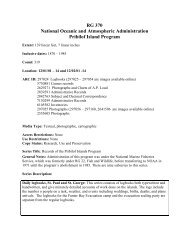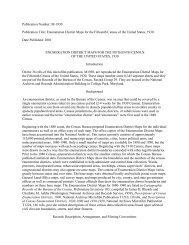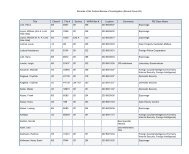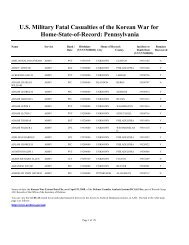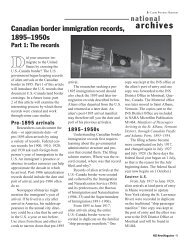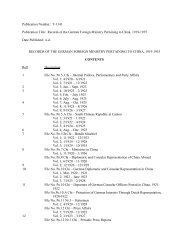HITLER'S SHADOW - National Archives and Records Administration
HITLER'S SHADOW - National Archives and Records Administration
HITLER'S SHADOW - National Archives and Records Administration
You also want an ePaper? Increase the reach of your titles
YUMPU automatically turns print PDFs into web optimized ePapers that Google loves.
Kraus formed a private think tank in Salzburg called the Österreichische<br />
Forschungsinstitut für Wirtschaft und Politik, which conducted public opinion<br />
polls <strong>and</strong> reported news <strong>and</strong> opinion in a weekly called Berichte und Informationen.<br />
He also had a relationship with CIC, having turned over various SS personalities to<br />
U.S. authorities after the war <strong>and</strong> having helped create four intelligence operations<br />
including Project Jackpot, aimed at the KPÖ. Berichte <strong>and</strong> Informationen was<br />
highly critical of the Soviets but also complained about the “punitive” nature of<br />
denazification in Austria, which prevented a more “spiritual denazification” <strong>and</strong><br />
the joining of Austria with the western bloc of nations. The CIC viewed Kraus as<br />
reliable <strong>and</strong> pro-American, with “mild rightist tendencies.” 42 The CIC’s operations<br />
chief in Salzburg, Maj. James V. Milano, noted in 1948 that up to one-third of the<br />
Army’s intelligence efforts in Austria depended on Krause. 43 In fact, his research<br />
institute might have had an intelligence-gathering function. 44<br />
In February 1949 Kraus formed a fourth political party called the League of<br />
Independents (Verb<strong>and</strong> der Unabhänginge––VdU). It was a non-religious party<br />
committed to free markets that aimed to attract the uncommitted 30 percent<br />
of the Austrian electorate, including “intellectual Nazis,” right-wing Socialists,<br />
<strong>and</strong> conservative independents, all of which, he felt, could produce 1.5 million<br />
votes. 45 Kraus hoped he could form a right-wing coalition with the ÖVP. The<br />
Spinne was an organization of former war criminals <strong>and</strong> other “implicated”<br />
Nazis. They could neither vote nor serve in state office, <strong>and</strong> they faced possible<br />
criminal charges. They aimed to take over the VdU from within <strong>and</strong> govern from<br />
behind the scenes afterwards. Austrian historian Lothar Höbelt dismisses the<br />
Spinne entirely in his apologetic history of the VdU. 46<br />
The CIC first learned of the Spinne in September 1949 after the ÖVP began<br />
an anti-VdU press campaign aimed at maintaining ÖVP vote totals. 47 In an<br />
extensive investigation CIC special agents interviewed VdU functionaries who<br />
had resigned from the party, intercepted <strong>and</strong> transcribed telephone calls to <strong>and</strong><br />
from VdU leaders, <strong>and</strong> studied key VdU documents. One of the informants was<br />
Karl von Winkler, a former Abwehr major who had worked against the Nazis in<br />
Austria <strong>and</strong> who was a founding member of the VdU, hoping that it might become<br />
a legitimate nationalist party. 48 Another was Hans Georg von Schwarzkopf,<br />
Kraus’s private secretary, who was a reliable U.S. informant, providing extensive<br />
information on Kraus, the VdU, <strong>and</strong> its Nazi supporters. 49<br />
The CIC <strong>and</strong> Right-Wing Shadow Politics | 61



